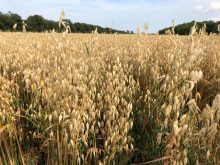Two new national-level research networks, focused on renewable fuels from biomass and on the maintenance of insect pollinator populations, will be spearheaded from the University of Guelph.
The Natural Sciences and Engineering Research Council (NSERC) last week announced the formation of nine such networks, each receiving $1 million per year for the next five years.
The Guelph-based Bioconversion Network and the Canadian Pollination Initiative (CANPOLIN) will be led respectively by professors Hung Lee and Peter Kevan, both from the U of G’s School of Environmental Sciences.
Read Also

Feed Grain Weekly: Barley still the king of Canadian feed grains
Brandon Motz of CorNine Commodities in Lacombe, Alta. said barley is still the preferred feed grain of choice here and abroad.
The Bioconversion Network is meant to develop “energy-efficient, commercially viable and environmentally sustainable biomass conversion processes” that would ultimately lead to the production of new fuel, chemical and energy products.
The network is expected to bring together a research team of 12 investigators from five universities, working with industry to “overcome the various scientific and technical barriers that are standing in the way of turning Canada’s vast quantities of forest waste residues into fuels and chemicals,” the university said.
“Society has an over-reliance on petroleum, and it undermines long-term energy security and stifles economic growth,” said Lee, who will serve as the network’s co-scientific director with Jack Saddler, dean of forestry at the University of British Columbia.
“We want to generate innovations that will benefit both the environment and the economy, and help Canada make the transition from a petroleum-based economy to a biobased one,” Lee said in a U of G release.
CANPOLIN, meanwhile, is to include 44 researchers from 26 schools, directed by Kevan, a recently-retired insect ecologist who’s been studying pollinators for more than 30 years.
“The diversity and abundance of insect pollinators are in a global state of decline due to such factors as disease, pesticide exposure, malnutrition, habitat loss and climate change,” the university said.
In Canada, the U of G noted, 28 species of butterflies and moths and two bee species are known to be at risk, while in the U.S., honeybees have declined 30 per cent in the past 20 years.
Researchers have previously warned that this decline poses a “serious threat to natural ecosystems and crop production,” the U of G said, noting the value of insect pollination in Canadian agriculture has been estimated at around $1 billion.
CANPOLIN researchers will look at “all aspects” of pollination, including pollinator health and conservation, plant gene flow, the impact of climate change, economics and future management needs.

















